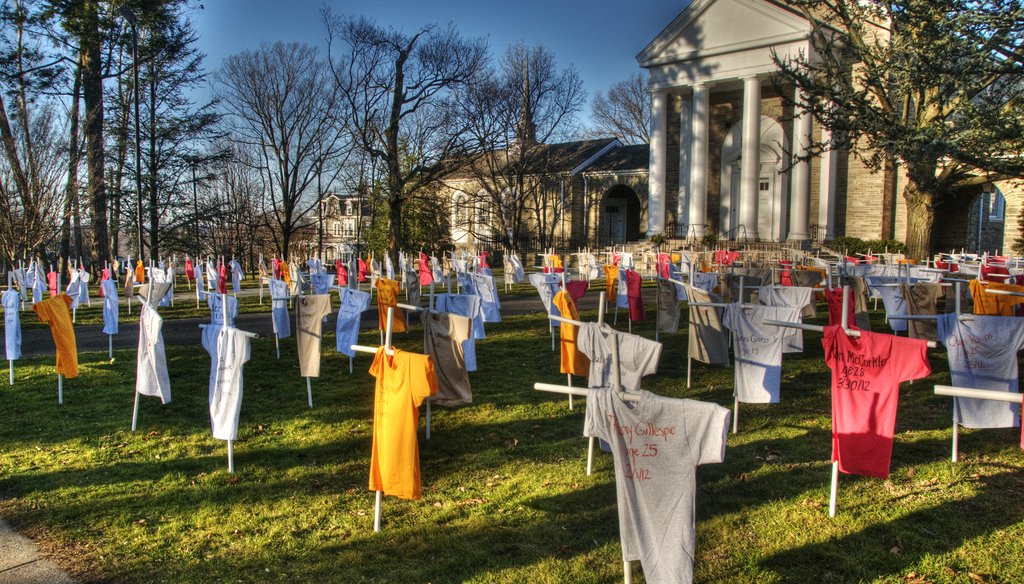Stand up for the facts!
Our only agenda is to publish the truth so you can be an informed participant in democracy.
We need your help.
I would like to contribute

A gun violence for memorial marking each fatality in Philadelphia in 2012. Credit: Cocoabiscuit/Flickr
A City Council hearing last week brought the underlying causes of gun violence into focus. Many residents might guess that shootings in the city are overwhelmingly drug-related. Many, according to Philadelphia Police Commissioner Richard Ross’ testimony, would be wrong.
"Our biggest issue is retaliatory violence," he explained. "Much of the time, it’s young men using gun violence as a means to resolve disagreements." He said it could come down to something as simple as a dispute over a girl. When At-Large Councilwoman Helen Gym repeated his point, he furthered it. Not just shootings, but "a lot of violence, period," he stated.
The Philadelphia Police Statistical Unit does not record assault cases by motive. Getting a sense of retaliatory violence, like the example of a shooting stemming from an argument between two men after the same woman, is a detail that Ross would ascertain from "looking at fact reports of the incidents," explained Officer Christine O’Brien, a police spokesperson, "but the statistics on motives are not categorized in that way."
There are databases that count the reported impetus behind homicides, but we did not find a public agency or research center that tracks these violent incidents overall. So we can’t put Ross’ claim on the Truth-o-Meter.
But here’s what we can say: The research available strongly suggests that the commissioner’s claim is on the money.
According to police data, seven percent of killings in 2015 had retaliation cited as the primary motive, and arguments were the listed cause for 44 percent. Combining numbers on these two categories to encompass Ross’ comments shows that these incidents represented the majority or heavy plurality of homicides in the city for the last five years.
A gun violence expert cautioned us that homicide classifications don’t quite cover it. Police told us something similar.
Officer Tanya Little, another spokeswoman, emphasized, "the facts would be under the umbrella of an investigation," and not all evidence is made public.
Jooyoung Lee, a sociology professor at the University of Toronto whose forthcoming book centers on how gun violence changes the social lives and professional outlooks of survivors, says that labeling an incident as a retaliatory works "on its face" but with deeper study, doesn’t really.
"One thing that we know is from the sociological and criminological overture is that these classifications schemes are not fool-proof," he said. "Sometimes the immediate things that precede violence may look just like retaliation, may look like just an argument or dispute, or may look like something’s that gang related, but behind the scenes, there’s a much larger story that helps contextualize these types of violence.
"Shootings often occur between individuals or even small groups that have conflicts with each other, but these conflicts aren’t just borne out of disagreements people have at an interpersonal level, they’re really shaped by a context of poverty and disadvantage… Most gun violence researchers know that gun violence is really a symptom of larger inequality."
Our Sources
Committee Hearing on Gun Violence, Philadelphia City Council Committee on Public Safety, Mar. 28, 2016
Report, "Citywide Homicides by Motive 2011 thru 2016," Statistical Unit, Philadelphia Police Department, obtained by request, Mar. 29. 2016
Phone Interview, Jooyoung Lee, professor, University of Toronto, Mar. 30, 2016
Phone Interview, Tanya Little, public information officer, Philadelphia Police Department, Mar. 30, 2016
Phone Interview, Christine O’Brien, public information officer, Philadelphia Police Department, Mar. 28, 2016
Email, Wesley Culp, deputy press secretary, Pennsylvania Department of Health

















































